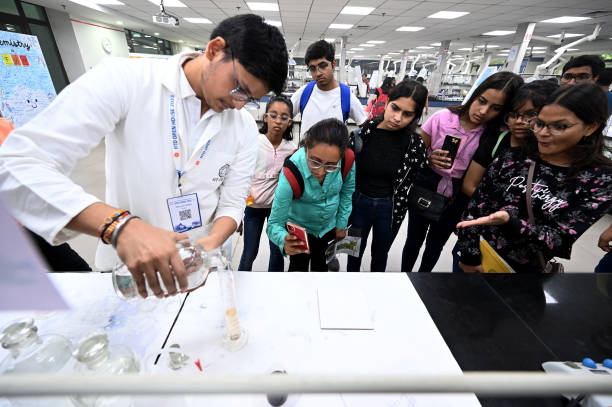
India recognises that its ambition to be a global power cannot be achieved unless it becomes technologically advanced. Indian leaders have known since independence that technology is key to developing the country and are very conscious of the need to catch the next technological revolution.
India invested heavily in leading edge technology including in nuclear research and outer space, and in research and educational institutions such as the Indian Institute of Technology. These efforts have become even more intense over the last few years both because of growing competition with China and India’s partnership with many technologically advanced countries.
India hopes that Australia, like many other Indian partners, will help New Delhi acquire the technologies it needs through direct transfers and collaborative work. With Australia in particular, collaborative research is the primary focus of Indian expectations.
One aspect of this is related to joint policy initiatives to safeguard the two countries and the region from predatory practices by adversarial great powers, specifically but not solely China. India wants to deepen cooperation with Australia and others in the Indo-Pacific to safeguard against cyber attacks and to provide political support to ensure free choice for countries in deciding their technological futures.
There have been concerns about China pressuring and incentivising many smaller countries to accept Chinese- designed and -built telecommunication networks, which carry significant vulnerabilities for the countries involved and the entire region. Such international policy collaboration has been a fruitful area of cooperation which should be continued and deepened.
More directly, India would like to deepen bilateral technology cooperation in areas such as cyber security and space.
In the cyber security domain, this could include the two taking the lead in developing regional digital resilience, instituting better cyber security practices, and enabling trusted value-based supply chains that remove disruptions and vulnerabilities and enhance cyber security across the region.
Similarly, sharing of critical intelligence—on threats and vulnerabilities—before a cyber security incident can occur, can be done through institutions like CERT-IN. Developing regular dialogue between institutions like the CERT and its counterparts could be a useful track. This could kick off as a collaborative venture between the Indian and Australian CERT organisations, but once it is up and running, it could be expanded to involve other like-minded partners including in the Quad. Such a dialogue can also be used to share information on new tactics and trends and new targets of cyber attacks. Strategies for responding to cyber attacks could be developed to make cyber security professionals in India and Australia more aware of trends and able to improve mitigation measures. Given the threat levels that India and Australia face, the two should also develop a joint threat and vulnerability index. This should not necessarily be a public document but could be shared between the cyber security agencies of the two countries. Some of these are already being discussed in the annual India-Australia Cyber Policy Dialogue, five rounds of which are already been held.
Space has become increasingly contested, reflecting tense political relations among the great powers. India and Australia, like many other countries, are deeply dependent on space to facilitate both their civilian economies and their national security agencies. This is potentially under threat because of the way space politics is developing, and in particular because of China’s activities in space.
While there is some preliminary cooperation between the two countries, this could be significantly enhanced. Australia can utilise India’s much larger space launch capability and its remote sensing technology. Australia’s experience in developing its space sector and specific space technologies could be of significant help to India. Creating linkages between private sector partners, especially startups and small- and medium-sized enterprises in India and Australia can be particularly meaningful in instituting a sustainable and more durable supply chain across the space sector.
Given the significant dependence on space in both India and Australia, any satellite disruptions, whether intentional or not, could have security and economic implications. The two countries can work on developing better redundancy measures, including through encryption measures on satellite data transmitted to and from satellites. The two can also collaborate at the political level in developing international consensus around safe and secure practices in space to ensure its continued viability for peaceful purposes.
Another area where the two countries can collaborate is on supply chain resilience in critical materials. China has tried hard to control these supply chains but permitting such controls would represent a serious vulnerability to both countries. Both India and Australia can also cooperate to generate wider coalitions that would help build consensus on developing standards, best practices and norms in the technological realm.

